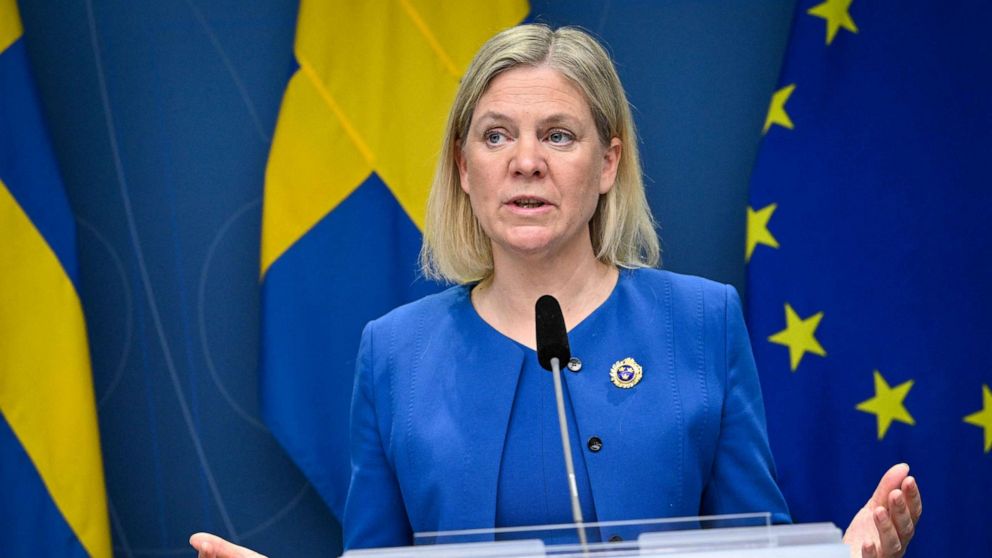


Sweden will apply to formally join NATO, following in the footsteps of neighboring Finland, the country's prime minister said, ending long-held positions of neutrality in the wake of the Russian invasion of Ukraine.
"The best for our country's security is that Sweden applies for membership in NATO and that we do it now together with Finland," Swedish Prime Minister Magdalena Andersson said on Monday. "And following today's debate in Parliament, the government is ready to make a decision about an application. That will be the starting point for a process that includes ratification in all the NATO member's parliaments and after that, the government will return to Parliament with a proposal for ratification for Swedish membership of NATO."
"As nonaligned countries, Sweden and Finland have been contributing to stability in our region, but that changed when Russia invaded Ukraine," she added.
President Sauli Niinisto and Prime Minister Sanna Marin of Finland announced their intention to apply for NATO membership on Sunday, with the country's Parliament expected to endorse the proposal as a formality.
Leaders in both Sweden and Finland had long been expected to apply to join the military alliance, as the war in Ukraine continues to have unintended consequences for Russia by potentially pushing two more of its neighbors into NATO.
Last week, Dmitry Peskov, Russia's presidential press secretary, said that "another enlargement of NATO does not make our continent more stable and secure." Peskov reiterated that stance on Monday, saying that although Russia had "no territorial disputes" with Sweden and Finland, unlike in Ukraine, Russia believed it to be a "serious issue" that they are following "very closely."
Swedish Minister of Foreign Affairs Ann Linde said last week that Finland's leaders had delivered an "important message," adding that her country "will decide after the report from the security policy consultations has been presented."
MORE: How NATO factors into the Ukraine-Russia conflictThe Scandinavian countries have long held neutral status when it comes to European conflict. Finland became a neutral country after the Second World War, while Sweden has resisted military alliances long before that.
Yet fears that Russia could do to other non-NATO countries what it has done to Ukraine has sparked a rapid shift in public opinion in both countries, one of which, Finland, shares an 830-mile land border with Russia.
Both could be on the cusp of joining NATO. NATO Secretary-General Jens Stoltenberg has publicly said the Nordic countries would be welcomed into the alliance, however the process could take months once their formal applications have been sent in.
Ahead of any official announcement from both countries for NATO membership, U.K. Prime Minister Boris Johnson had previously signed mutual security assurances in the wake of Russia's invasion of Ukraine.
NATO's expansion would be yet another unintended consequence for Russia, as they continue to be met with fierce resistance in Ukraine and a more united West than their intelligence assessments anticipated. Part of Russia's security demands ahead of the invasion in Ukraine included reverting NATO forces to 1997 positions.
Since NATO was founded in 1949, the alliance has expanded to include 30 member countries, including three former Soviet republics, and the inclusion of Sweden and Finland would further expand the alliance's influence in the Arctic and in the areas around Russia.
Stoltenberg said just days ahead of the invasion "if Kremlin's aim is to have less NATO on Russia's borders, it will only get more NATO. And if it wants to divide NATO, it will only get an even more united Alliance."
MORE: Putin defends Ukraine invasion while marking WWII victoryThis prediction now appears to be coming true -- although Kremlin spokesperson Dmitry Peskov last month said that NATO is a "tool sharpened for confrontation" and it is "not an alliance that ensures peace and stability" when asked about Sweden and Finland. Experts say the expansion will be evidence of yet another strategic blunder on Russia's part.
Even as public opinion has shifted, there are still those that opposes NATO membership for the Nordic countries, fearing it would lead to increased tensions with Russia.
"I'm afraid that NATO membership will increase actually the tensions in the Baltic Sea region and also will increase the tensions in Finland, especially regarding the eastern border," Veronika Honkasalo, one of the few members of Finland's parliament who doesn't believe the country should join, told ABC News.
Furthermore, there are concerns that Sweden and Finland could be vulnerable to Russian attacks during the application process, though State Department spokesperson Ned Price moved to reassure both countries last week, saying: "I am certain that we will find ways to address concerns they may have regarding the period between the potential application and the final ratification."
However, polling reported in both countries appears to show a significant majority are in favor of NATO membership.
MORE: How President Zelenskyy is helping Ukraine win the information war"[Putin] has for years said Finland and Sweden joining is a red line," Charly Salonius-Pasternak, lead researcher at the Finnish Institute of International Affairs, told ABC News. "He's managed to drive both Finland and Sweden towards NATO. So I think a massive miscalculation for him, but I think a positive thing for the rest of Europe."
"It's very clearly the population that changed its opinion in, say, six months, radically so," he said, adding that the shift in public opinion had a snowball effect into Sweden, as fears grew about what could happen without the umbrella protection of NATO membership as the war in Ukraine continued.
"Now Russia has gone so far that joining NATO seems to be the only genuine solution here," he said.